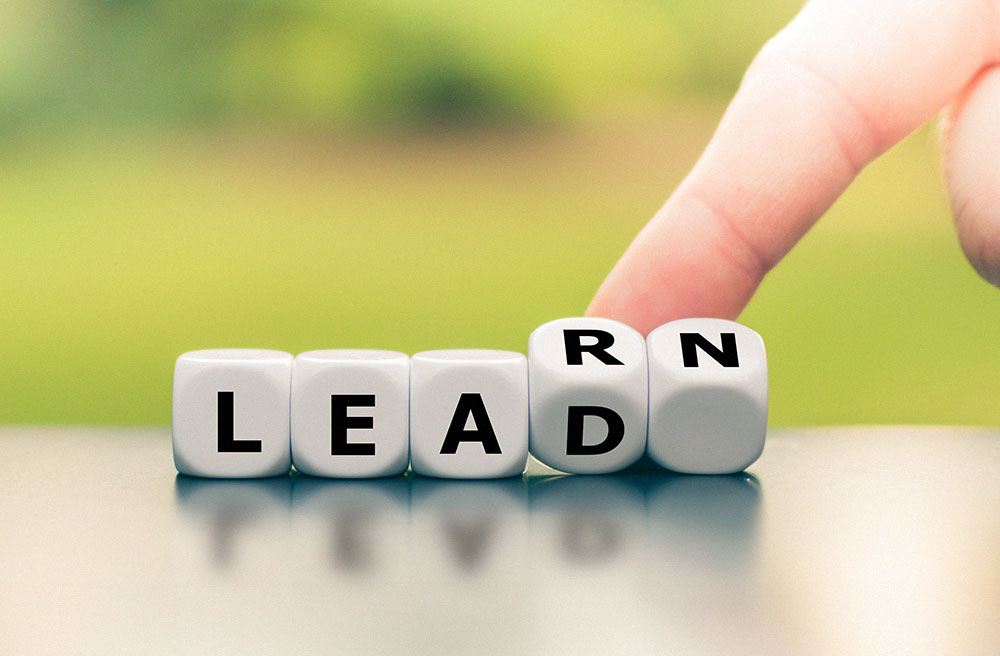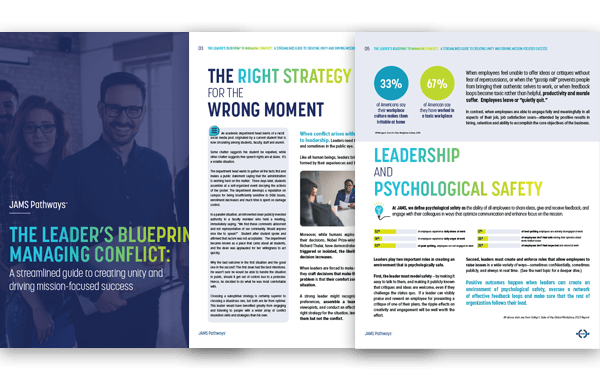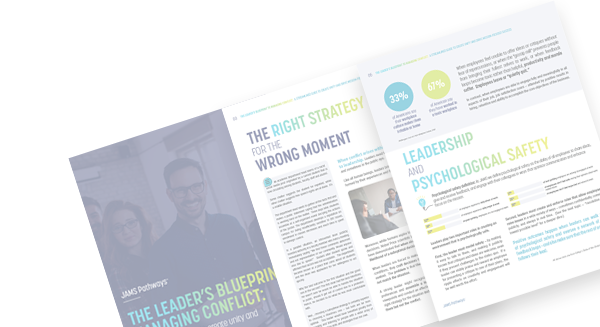News & Insights
BROWSE TOPICS
Empowering Leadership and the Importance of Conflict Resolution Skills in Management
AUTHOR

If only leadership were one-size-fits-all. The truth is, there is no cookie cutter-methodology to effective, empowering and essential leadership qualities. Yet effective conflict management strategies are often recognized in retrospect, guiding us to reverse-engineer our paths to success. So, as goals change, so must the leadership strategy designed to move an organization in the desired direction. Here, we’ll explore three leadership keys that are applicable to both an organization and its people.
First, culture should be a top-down phenomenon. My experience in an organization where the entire leadership team went to annual conferences with multiple opportunities for professional growth is a testament to this. These multiday conferences required the top staff to attend several trainings per day with curriculums designed to bolster particular skill sets with overlapping issues for the whole team. What stood out is that the CEO always attended and always sat at the front of the seminar.
If you’re wondering why the CEO always sat at the front, his answer was simple: “If I can take back just one new action, principle or methodology, the whole conference would pay for itself.” Imagine that you are watching this person and seeing how he innovates and improves the organization with intentionality every day. It normalizes change and the recognition of the need for adaptability.
Secondly, almost every challenge in the workplace involves some form of conflict. Whether it’s interdepartmental disputes or friction with outside forces, every challenge carries an element of disagreement. When there is a difference of opinion on how to resolve a conflict between team members, what is the culture for dispute resolution? Who sets the tone? It's not just about settling disputes; it’s about establishing a process that’s as productive as the outcomes it aims to achieve.
Ironically, we expect people to resolve disputes, internal and external, even though they have absolutely no training, no experience and no frame of reference for how to resolve a dispute. Think of it this way. If there were a huge fire in a building, everyone inside would know to walk swiftly to safety. But there is one group of people who would run toward the fire: highly trained professionals who know what to do in the event of a fire.
Yes, you guessed it. Trained fire professionals would employ the quickest, safest way to extinguish the fire. Similarly, there are people who use these skills in the corporate setting to resolve disputes, soothe clients and save the day. But how many of these people are trained to use their natural talent to keep the organization moving forward?
Imagine a workplace where many of the professionals revel in their ability to resolve conflict consistent with the goals of the company rather than personal ego, power trips or misdirection. Just as work is not static, neither is the ability to assess a situation and make the appropriate adjustments.
By investing in conflict resolution training, we set up the organization for success with leaders equipped to recognize when it’s time to collaborate or adjust for the overall benefit of the team. The shift in the focus from individual leadership to collaboration and execution will enable and support a culture of best practices.
Finally, every new leadership tool requires a check-in. Is it working? More importantly, does it need refinement so it can be a more effective tool for the organization? Adjusting training and rollout—transitioning from a conflict avoidance stance to one of proactive conflict management leadership—can mean the difference between a culture that thrives and one that stumbles.
This page is for general information purposes. JAMS makes no representations or warranties regarding its accuracy or completeness. Interested persons should conduct their own research regarding information on this website before deciding to use JAMS, including investigation and research of JAMS neutrals.

Start Your Journey Now
Book a Free Discovery Call
Book a discovery call today.
Customized Client Solutions
Download our streamlined guide
The Leader's Blueprint to Managing Conflict
In this practical, step-by-step playbook, our experienced facilitators explain how to efficiently resolve workplace conflict to create unity and drive mission-focused success.



